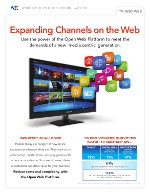TV and Media Activity
A turning point for TV: Lead the change with W3C
"Learn the lesson that the music industry didn't learn" — Kevin Spacey
TV turning point
Video now accounts for over half of internet traffic and as of 2013, Americans consume more digital content than TV content.
Interactive
TV is no longer passive — most people (77% according to one study) use a second device while watching.
Demand for on-demand
People don't want fixed bundles of programs delivered at fixed times — they like to splurge on specific shows.
Advertising sea change
TV advertising revenue is losing ground to digital advertising revenue, which has double digit growth.
Diverse market players
IPTV subscribers are increasing while the cable-like TV providers are facing an increasingly challenging environment.
Easier access
More higher-powered Web-enabled TVs and lower-cost Web-enabled dongles are being launched and sold, meaning better Web browsing capabilities whether consumers upgrade their TV or not.
The Open Web Platform is Transforming Television
 The Open Web Platform offers tremendous potential as the driver behind the transformation of the TV industry. The platform forms the foundation of how video and audio is increasingly consumed and will continue to be in the future. To help affected parties shape this transformation and maintain a competitive advantage, we have established two groups — the Web and TV Interest Group which requires full membership of W3C, and the Web and Broadcasting Business Group which is open to non-members and focuses on the needs of the traditional broadcasting industry.
The Open Web Platform offers tremendous potential as the driver behind the transformation of the TV industry. The platform forms the foundation of how video and audio is increasingly consumed and will continue to be in the future. To help affected parties shape this transformation and maintain a competitive advantage, we have established two groups — the Web and TV Interest Group which requires full membership of W3C, and the Web and Broadcasting Business Group which is open to non-members and focuses on the needs of the traditional broadcasting industry.
The TV Industry is Shaping the Web
With the creation of the Web and TV Interest Group and the Web and Broadcasting Business Group, W3C has brought stakeholders together to not just face these challenges but to help set the direction in which technological progress is made. While the groups do not create Web specifications directly, the expertise of the members has resulted in requirements that have been adopted by the relevant Working Groups. This has led to innovative enhancements to the specifications that browser vendors and other Web implementors rely on. For example, members from the TV industry have:
- Proposed adaptive streaming for HTML5 video, resulting in Requirements for Adaptive Bit Rate Streaming.
- Proposed extended functionality of media streams in HTML5, resulting in the Media Source Extensions specification.
- Helped creation of network service discovery spec in Device APIs WG, resulting in the Network Service Discovery specification.
Now is the time you can influence how the next generation of TV evolves.
More and more broadcasters, cable operators, telecom operators, multiple service operators (MSOs), IPTV providers, hardware vendors, browser and software vendors and other participants are shaping the way TV is created, controlled and consumed on the Web.
What's next for TV and the Web
-
Testing
TVs are tested and certified as a matter of course. For the Open Web to become part of the TV ecosystem it needs better testing.
-
Audio support
For example sound effects such as in the gaming industry, which are 100% reliable and effective, are not at the same level of quality on the Web.
-
Multiple stream support
Often media streams are pieced together dynamically. The Web is not yet good enough at splicing and syncing streams.
-
Second screen support
Discoverability has been looked at resulting in the Network Service Discovery API but issues remain before adoption becomes widespread.
-
Multi-screen advertising support
To offset the slowdown in TV advertising spending, opportunities exist in more interactivity and user control.
-
Downloading and recording support
Technical issues need to be overcome to balance the requirements of content providers and the desires of content consumers, including licensing and offline content protection.
Shape the Web as a W3C Member
W3C Members play a significant role in shaping the Web. Contact W3C to learn more about the benefits of W3C Membership.
Reach People with the Open Web Platform
Read more about how the OWP creates new opportunities and lowers deployment costs on our information sheet.
